Table of Contents
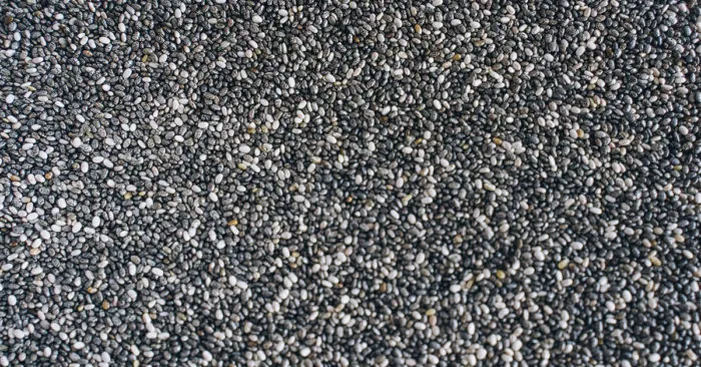
Chia seeds side effects: While chia seeds are becoming a popular superfood for their health benefits, it’s important to be aware of any potential downsides before incorporating them into your diet.
In this blog, we will look at the potential side effects of eating chia seeds, so you can make an informed decision about whether this superfood is the right choice for you.
Chia seeds: overview

Chia seeds come from a plant called “Salvia hispanica”, which is closely related to mint. (1)
Its consumption traces back to the Mayans and Aztecs as they consumed these seeds to boost their energy.
Actually, in the Mayan language, the word “chia” means “strength”! (2)
Today, chia seeds are very famous for their nutritional virtue as an energy booster for everyday life or as a substitute in a vegetarian diet.
Do chia seeds go bad?
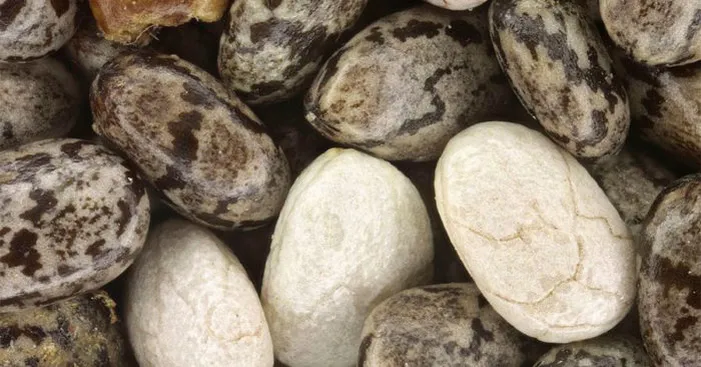
As I explained in a related post about peanuts, oleaginous fruits contain oil and oil becomes rancid and expires.
These seeds contain oil, and usually, you find a “best consumed before —-” note and that proves that they can go bad.
When they go bad they usually taste a little bit bitter and if eaten can cause health issues. (3)
Frozen chia seeds can last for several months but once stored in poor conditions (exposed to humidity or light) they promote the growth of mold and go bad faster.
So what are the side effects of eating chia seeds?
Chia seeds side effects:
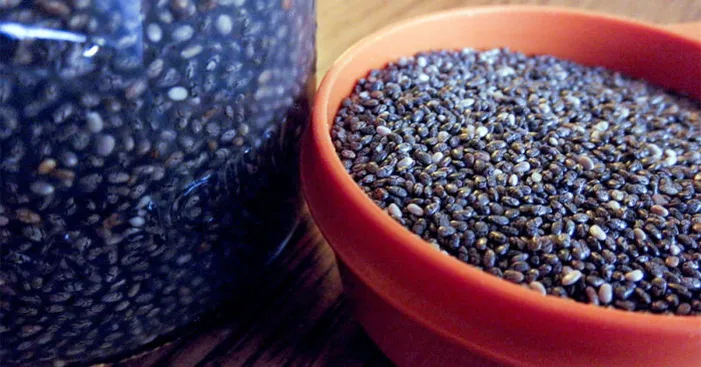
These seeds contain a great abundance in most of the essential elements like fibers, proteins, minerals, fatty acids…
No wonder why people use it as a natural supplement to regulate blood pressure and sugar levels and many other issues.
However, over-consumption of chia seeds causes several health complications.
Generally, the side effects of eating too many of these seeds are rare and when they occur they are mild.
But we need to be aware as these side effects can get severe especially in case of an interaction with medicines or allergy.
Most of the side effects are easily preventable by adjusting the way you use them and the amount you ingest.
Here are the possible side effects of:
May cause prostate cancer:
Mostly known for their fatty acids, chia seeds contain ALA (alpha-linolenic acid) a type of fatty acid that belongs to the omega-3 family and is found in most plant-based food.
In recent years, some studies have linked the risk of getting prostate cancer to ALA intake. (4)
A large research study that included more than 280,000 men showed that the risk of advanced prostate cancer occurred more often than those who had ALA intake regularly.
The studies on this topic are extremely contradictory as other researches showed exactly the opposite. (5)
A review of five similar studies has proven that people who had 1.5 grams of ALA per day have lower risks of getting prostate cancer compared to the people who had less ALA than that.
It is important to mention that these studies may lack certainty as they only took into account ALA intake as a factor regardless of the people’s conditions (or other factors that may have played a role).
Until further studies confirm otherwise, chia seed’s ALA fatty acid can cause harm and it is important to pay close attention to our daily intakes of chia seeds.
Presents a high risk of choking:
Chia seeds are really dry and when exposed to water they can absorb up to 20 times their weight. (6)
This can result in more risks of choking as the seeds can easily swell and block the throat.
A case study involved a 39-year-old man who had a near-death experience related to choking on chia seeds.
The man had a tablespoon of dry chia seeds and then drank water. (7)
A few minutes later the seeds swelled 20 times in size and caused a blockage in his esophagus (a tube connecting the throat to the stomach).
The man was rushed into an emergency room to have it removed.
Choking on seeds is more common with people who have difficulties swallowing.
Always make sure you soak chia seeds in water for at least 10 minutes before eating them and avoid drinking water right after eating these seeds.
Has hypotensive effect:
Among the many properties of chia seeds, they have mild anti-hypertension properties capable of lowering blood pressure.
Even though this is beneficial for people who deal with hypertension it can have a side effect for some people.
For those who suffer from hypotension and already have low blood pressure, eating chia seeds would aggravate their situation. (8)
May cause digestive problems:
Chia seeds are very rich in fibers with up to 40% of their weight coming from fibers.
Just a tablespoon of these seeds provides 4 grams of fibers and that’s around 16% of the daily recommended intake. (9)
As essential nutrients, fibers are important for our health as they promote beneficial bacteria in the guts and contribute to many intestinal functions.
Nevertheless, too much fiber can cause serious health issues including constipation, abdominal pain, diarrhea, bloating, and gas. (10)
Generally speaking, fibers pass through the body without being digested.
They ease the movement of our stomach and flush free radicals and cholesterol out of our bodies.
As the fabric component of stool, fiber intake is directly linked to healthy digestion or may be connected to having constipation or diarrhea.
High fiber intake accompanied by dehydration may lead to severe health issues as the water is much needed for the fibers to move smoothly within the intestines.
Has anti-coagulant effect:
One of the many nutrients abundant in chia seeds is omega 3 fatty acid with more than 8 times the daily need in just 2 tbsps.
Omega 3 fatty acids have a mild anticoagulant effect which acts on the viscosity of the blood by liquefying it.
Now this should not be an issue, however, it could create several side effects including:
- Excessive bleeding (in case of menstruation or injury).
- Vomiting.
- Headaches.
- Drowsiness.
- Colored urine or stool.
- Joint pain.
Some people are allergic to chia seeds without knowing:
Although very rare, some people do have an allergic reaction after eating chia seeds.
Food allergies have common symptoms that could range from an itching tongue to diarrhea or even vomiting.
In extreme cases of food allergies, there could be a life-threatening condition where the person has difficulties breathing with tightness in the chest and throat.
Usually, people who are allergic to flaxseed, mustard, or sesame seed, are more likely allergic to chia seed as well. (11)
If you never tried them before, start eating them with small doses and pay attention to any odd symptom: hives, watery eyes, rashes… stop using them and consult a doctor.
If no symptoms show then you’re most likely not allergic to chia seeds and you can increase the dose slowly until you reach the recommended daily intake (2tbsp).
Could interact with medicines:
Even though chia seeds are very beneficial for our health, they may cause problems especially for people who are taking medication for blood sugar or blood pressure.
Interaction with diabetes medications:
Due to the high amount of fiber in chia seeds, they significantly slow the absorption of blood sugar and that lowers blood sugar levels.
When consuming them moderately, they are beneficial for people with diabetes as they can help control the level of glucose.
However, eating too many chia seeds will require an adjustment of diabetes medications.
Interaction with blood pressure medications:
Chia seeds have some anti-hypertensive properties that can lower DBP (diastolic blood pressure).
A study conducted by St. Michael’s hospital in Toronto has confirmed that chia seeds are capable of reducing DBP levels. (12)
This is due to the good amount of omega-3 fatty acids which act as anticoagulants and lower blood pressure.
This is beneficial, but for people who deal with a low blood flow, this property must be taken into consideration as we don’t want the blood pressure to go down even further.
Safe dosage to avoid chia seeds side effects:
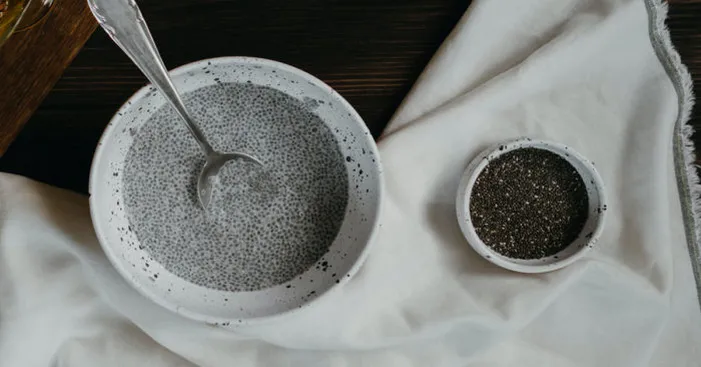
Even though consuming chia seeds moderately can still have some side effects for certain people, there is a safe dosage that everyone should consider.
Pregnant women, those about to undergo surgery and people taking blood thinners should avoid chia seeds completely.
As for the rest of the people, they need to know how many chia seeds they could eat to get their benefits without side effects.
The daily recommended safe dose goes as follows: (13)
- Minors: (4 to 18 years old) 1 tbsp a day or 10g.
- Adults: 2 tbsps a day or 20g.
- For cardiovascular protection: 3 to 4 tbsps daily for 3 months as a natural treatment for heart issues.
Eating high quantities of chia seeds (more than 3 tbs a day) cause digestive side effects.
This is why it is recommended to drink around 13 cups of water a day (5 normal water bottles ½ liter).
Also, you should only consume soaked chia seeds no more than 3 tablespoons a day divided two or three times.
Follow the safe dosage and you will enjoy their many health benefits without suffering their side effects.
Conclusion:
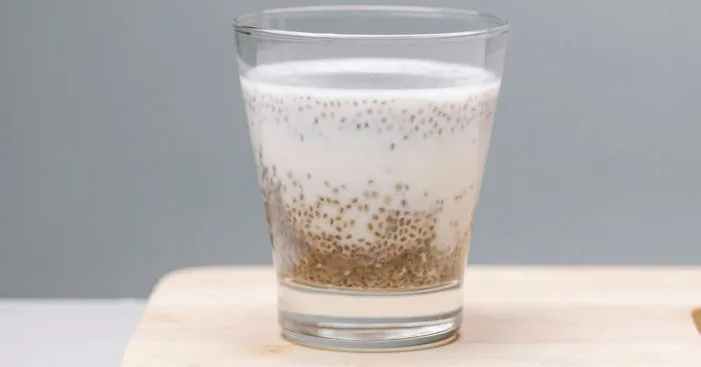
Chia seeds are full of nutrients and are among the few plant-based foods that can be a complete source of protein.
Nevertheless, eating too much of any food can lead to health issues.
With chia seeds, it is recommended to soak them in water 10 minutes before you eat them.
A dose of two tablespoons of soaked chia seeds, a day will offer all the health benefits you need from these seeds.
If you have diabetes or take blood pressure medicines, make sure you consult your doctor before you eat chia seeds.
However, if you are new to chia seeds consumption and you start experiencing negative symptoms, stop eating them, and consult a doctor.
References:
(1): chia | Description, Plant, & Nutrition | Britannica
(2): Chia – UsDurum
(3): Do Chia Seeds Go Bad? Ultimate Explanation 2022 (lacademie.com)
(4): A 24-year prospective study of dietary α-linolenic acid and lethal prostate cancer (nih.gov)
(5): The relation of alpha-linolenic acid to the risk of prostate cancer: a systematic review and meta-analysis – PubMed (nih.gov)
(6): What Happens to Chia Seeds Soaked in Water? – Darin Olien
(7): Watch It Grow: Esophageal Impaction With Chia Seeds: 833 : Official journal of the American College of Gastroenterology | ACG (lww.com)
(8): Chia Seeds For Blood Pressure (bloodpressureexplained.com)
(9): One Major Side Effect of Eating Chia Seeds — Eat This Not That
(10): Too much fiber: Symptoms and treatment (medicalnewstoday.com)
(11): Chia Seed Allergy and Symptoms & Signs due to its Allergic Reaction (ayurtimes.com)
(12): Eating Chia Seeds Lowers Blood Pressure and Inflammation (alignlife.com)
(13): How Much Chia Seeds Per Day — Chia Seeds Serving Size (nutstop.com)
